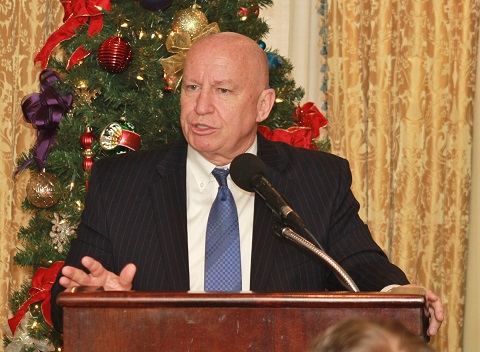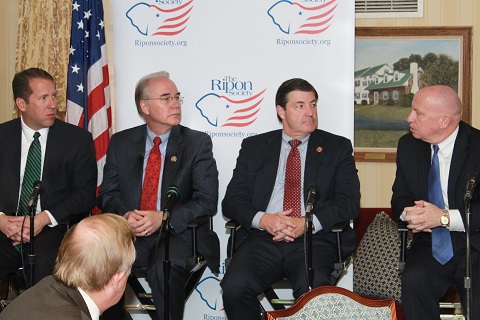Brady, Gerlach, Price and Smith Talk About Their Opposition to Obamacare and the GOP Effort to Craft an Alternative Reform Plan
WASHINGTON, D.C. – With concerns over the Affordable Care Act increasing every day, The Ripon Society hosted a breakfast discussion yesterday morning with four members of the Ways & Means Subcommittee on Health, who are leading the effort to repeal the law and replace it with a reform plan that controls costs, cuts red tape, and makes patients and doctors the focal point of health care decision-making, as opposed to Washington bureaucrats.
The Members taking part in the discussion included U.S. Reps. Adrian Smith (NE-3), Tom Price (GA-6), Jim Gerlach (PA-6), and Kevin Brady (TX-8), who serves as Chairman of the Health Subcommittee and opened the discussion by outlining the panel’s agenda for the 113th Congress, and its immediate priorities heading into next year.
“This session, the Health subcommittee set out three clear goals,” Brady stated. “The first was to shine a bright light on the rollout, implementation, and impact of the Affordable Care Act. Our second goal was to find a permanent, reliable solution to how we reimburse our physicians under Medicare. And our third goal was to take steps to bring about structural reform in Medicare — both in the context of how we can pay for a permanent solution for our physicians, but also how we can extend the life and ultimately save Medicare as a vital program going forward.”

“The immediate issue before us is how we reimburse our physicians. You know the problem here – the 15 years of continued extensions; how we’ve moved physicians locally from being irritated, to frustrated, to angry. Now they’re changing their behavior. They’re rethinking their relationship with Medicare, and they’re rethinking their private practices at a time when the senior population is skyrocketing. If there’s any population that needs to see a doctor they know and one who knows them, it’s our seniors. And the truth of the matter is, we can’t really take the necessary steps to fix Medicare until we solve this in a very positive way.”
Brady was first elected to the House in 1996. Appointed Chairman of the Health Subcommittee in January of this year, he emphasized the importance of including doctors in any discussion about how to improve the quality of health care and why he is encouraged that needed reforms – including reforms to the Medicare Sustainable Growth Rate (SGR) — can be passed in the coming year.
“We’ve reached out to 75 national physician organizations asking a simple question: how do you measure quality in your practice? What really works? We’re putting together a proposal that brings forward those quality measurements, driven by physicians and driven by what’s already working today. And ultimately, we hope that over the decade, we will begin reimbursing not just on quality, but on efficiency. Not just higher quality health care, but at a lower cost as well. It’s a tougher target to hit, but it can be done because we’re seeing it occur today. The challenge, of course, is to do this in a way where you both encourage physician groups that are already doing all of this beautifully, while also recognizing that for physicians in rural communities nearing retirement, this is a much tougher haul for them.”
“So I’m encouraged by it. We’ve got an awful lot of work to do. I’m absolutely confident we can get it done this session. My preference is sooner rather than later. We will not have a perfect replacement at the end of the day. But I want to set a whole new foundation. Rather than every year talking about the 20 or 30 percent cut, with struggling physicians really wondering where they fit in all of this, I want a foundation that changes that old discussion, so the discussion in future years is how do we make this system even better, not how do we avoid a catastrophe every year at Christmas time.”
Gerlach echoed Brady’s concerns with the health care reform law. He also talked about the concerns he is hearing about the law from the people he represents back home, and why his decision to oppose the measure in 2009 was, he said, one of the best votes he has ever cast.
“What you see playing out with the Affordable Care Act is playing out the same in the 6th Congressional District in southeastern Pennsylvania,” the veteran lawmaker stated. “I did a tele-town hall the other night and we had a couple of callers who got those notices from health care providers about the cancellation of various policies. They’re very, very concerned about where they’re going to go in the coming weeks to get reinsured. In Pennsylvania, the insurance commissioner has not come out in favor of the President’s fix, in terms of saying to insurance carriers that they have to extend their policies for another year. And so there’s great uncertainty in Pennsylvania about whether individual policy holders will have any place to land by the end of the year as we start 2014.”
“I look at the Affordable Care Act as the best ‘no’ vote I’ve had in my 24 years of state legislative and now federal legislative service. It is just a terrible, terrible Act. Our obligation moving forward is, number one, identify the problems — we’ve pretty clearly been able to do that. Two, offer a positive agenda in Congress and to our constituents about how we will fix this situation. And at the same time, we have to help our constituents through a problem that we didn’t create with our vote.”
Price agreed.
“I don’t think there’s a soul in America who thinks Republicans like the ACA,” the Georgia Representative stated. “And as this thing crumbles, it’s clear which side of the aisle is in support of propping it up. I also think that our Republican caucus is more united coming out of October than we were before. That’s because in spite of the decisions that were made and the strategy that was adopted, we actually linked arms together and said, ‘Okay — here we go.’ I think that’s important going forward especially for the work that needs to be done in the 13 months left in the 113th Congress.”
“People back home are excited about what seems to be a movement in the Republican direction on health care issues, They recognize that there are solutions out there and we certainly don’t need to put the government in charge. And they ask, ‘How long is this going to last?’ I think it’s important for people to appreciate that this will continue to last as long as this law stands. If you just sit back and look at the next four to six to eight months, it’s more than just a website. The fact that you can’t keep your plan in spite of the President’s promise is clear to all Americans now.”
“One of the next steps is that you can’t keep your doctor. There are so many people who are going to realize that their doctors can’t continue to practice in this environment. Or, even if they were pushed from a private plan or to a plan in the same company, the plan is going to be more narrow. So the doctor they were going to see before, they probably aren’t going to be able to see again. They also likely aren’t going to be able to go to the hospital that they went to, so those things are going to drip out in the next few months.”

Price, who spent nearly two decades in private practice as an orthopedic surgeon prior to his election to Congress in 2004, also talked about the plans that he and other Republicans currently support to reform health care, and why he is hopeful that the party will be able to rally around support of one bill.
“Republicans probably have too many plans as opposed to too few,” he said. “I’m confident that we’re talking with the Ways and Means folks and the Leadership to make sure that we have a legislative proposal hopefully in the first quarter of next year that will put our arms around the things that we know can be done in good ways. It won’t be soup to nuts, but it will be a plan where people can say, ‘That makes sense.’”
Smith shared his colleague’s optimism that a plan would be agreed to, as well as his conviction that reform could not come soon enough.
“There are new regulations being announced as we speak that are very arbitrary,” the Nebraska Republican stated. “I met with a leading scientist yesterday who is concerned with how this will affect innovation. That’s no surprise. I am really concerned by just the complexities of Obamacare alone, not to mention the fact that it didn’t even address some of the realities of SGR. I think that there are good faith efforts on both sides of the aisle to bring about a resolution that really should have been included and I think it may have changed the debate a bit, as well. But that’s water under the bridge. Here we are with a system that is broken and getting worse.”
“The most common request from my constituents is to be left alone. These patients, these consumers, these people — they’re fighting this battle on the front lines. And these are individuals who are doing everything a responsible person should do to plan for their future, including buying health insurance to cover preexisting conditions. It was a plan that they liked, now they’ve lost it. I’ve had public meetings across the district hearing from these individuals, and one lady I heard from in my home community showed up with a cancellation letter. She said she had a preexisting condition. We are lead to believe lately that no private insurance company was covering a preexisting condition, and yet many were. So we need to work through all these things and certainly provide a better alternative, because that’s what the American people want, and quite honestly, that’s what they deserve.”
The Ripon Society is a public policy organization that was founded in 1962 and takes its name from the town where the Republican Party was born in 1854 – Ripon, Wisconsin. One of the main goals of The Ripon Society is to promote the ideas and principles that have made America great and contributed to the GOP’s success. These ideas include keeping our nation secure, keeping taxes low and having a federal government that is smaller, smarter and more accountable to the people.



